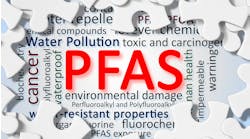Scientists in Belgium have developed a new CO2-based method for making polyurethane (PU)-based plastics that are easy to recycle. Such plastics are difficult and, in the case of thermosets, almost impossible to recycle. They also require toxic isocyanates during manufacturing.
The team at the University of Liège’s chemistry department has produced oxazolidone monomers from CO2, with a process described in a recent issue of the Journal of the American Chemical Society as facile, scalable and starting from cheap reagents.
These are then copolymerized with a CO2-based polythiol under mild conditions and in the presence of a catalytic amount of acid to create polymer networks.
By tweaking the copolymerization reaction, the networks can be tuned to have a range of mechanical properties similar to commodity plastics ranging from polydimethylsiloxane (PDMS)-like elastomers to polystyrene-like rigid plastics.
According to Christophe Detrembleur, research director at Liège, further studies on the new chemistry and building blocks are currently underway and focus on recyclable 3D printed/printable products, coatings and adhesives.
“We are currently more involved in their mechanical recycling as this is the easiest to implement to reuse and reshape products. The product to be recycled can be extruded and/or compression molded to reform another object. However, this depends on the product being studied. The advantage of our process is that we can choose the recycling option depending on the needs,” he explained.
The new studies also have increased the initial 20g yield to up to 200g — the maximum needed for these investigations. For confidentiality reasons, Detrembleur isn’t able to elaborate on the process but says it’s very easy to scale up: “I do not see major issues for larger scale production — just the need for a reactor able to work under CO2 pressure.”
He also hints at industrial interest in the work: “These plastics are recyclable non-isocyanate polyurethanes (NIPUs), thus a class of greener polyurethanes. The PU business is extremely large, and most producers are looking for alternatives that are not only isocyanate-free but also recyclable, which is what we have here with our new products. There is thus an industrial interest in recyclable NIPUs, but I cannot go into detail.”
Meanwhile, the paper notes that while the new polymers show great potential for circular materials currently being made of PUs, their application could go well beyond, for example, by using dynamic linkages to improve the recyclability of other thermosets.



